
Depeche Mode are an English electronic music band formed in Basildon, Essex in 1980. Originally formed by the lineup of Dave Gahan, Martin Gore, Andy Fletcher and Vince Clarke, the band currently consists of Gahan and Gore.

Martin Lee Gore is an English musician and songwriter. He is one of the founding members of the electronic rock band Depeche Mode and is the band's main songwriter. He is the band's guitarist and keyboardist, and occasionally provides lead vocals. Gore possesses a tenor singing voice which contrasts with lead vocalist Dave Gahan's dramatic baritone. He is also known for his flamboyant and (sometimes) androgynous stage persona. Gore has also released several solo albums and collaborated with former Depeche Mode member Vince Clarke as part of VCMG.

Speak & Spell is the debut studio album by English electronic music band Depeche Mode. It was released on 5 October 1981, or possibly 29 October 1981, by Mute Records. It was the band's only album to feature Vince Clarke, and is much lighter in tone than their subsequent releases.

Remixes 81–04 is a remix album by English electronic music band Depeche Mode, released on 25 October 2004. It was the band's first release since Daniel Miller's independent label Mute Records was acquired by industry major EMI in 2002. It features well-known remixes from the band's back catalogue, as well as previously unavailable mixes.

"Stripped" is a song by British electronic music band Depeche Mode. It was released as the lead single from their fifth studio album Black Celebration (1986) on 10 February 1986, through Mute Records. Written by the band's lead songwriter Martin Gore, "Stripped" introduces the more dark and sample oriented composition that featured on the Black Celebration album. It incorporates various samples into its instrumental; most notably, the sound of an idling motorcycle engine was recorded, altered slightly, and inserted as a percussive element.

Alan Charles Wilder is an English musician, composer, arranger, record producer and member of the electronic band Depeche Mode from 1982 to 1995. After his departure from the band, the musical project Recoil became his primary musical enterprise, which initially started as a side project to Depeche Mode in 1986. Wilder has also provided production and remixing services to the bands Nitzer Ebb and Curve. In 2020, Wilder was inducted into the Rock and Roll Hall of Fame as a member of Depeche Mode. He is a classically trained musician.

"Just Can't Get Enough" is a song by English electronic music band Depeche Mode. It was their third single, released on 7 September 1981, a month before the release of their debut studio album, Speak & Spell. It was recorded during the summer of that year at Blackwing Studios, and was the band's first single to be released in the United States, on 18 February 1982. A riff-driven synth-pop song, "Just Can't Get Enough" was the final single to be written by founding member Vince Clarke, who left the band in November 1981.
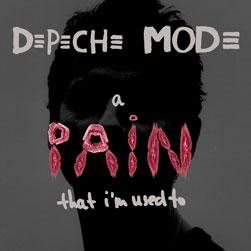
"A Pain That I'm Used To" is a song by English electronic music band Depeche Mode. It is the opening track on their eleventh studio album, Playing the Angel (2005). It was released as the album's second single on 12 December 2005 through Mute Records.

"Dreaming of Me" is the debut single by English electronic music band Depeche Mode. It was recorded in December 1980 at Blackwing Studios and originally released in February 1981 in the UK via Mute Records. It was not commercially released in the United States.

"See You" is the fourth UK single by Depeche Mode, and the first Depeche Mode single written by Martin Gore. The single was released on 29 January 1982 and was later included on the band's second album A Broken Frame. It was the first single the band released as a trio, due to Vince Clarke's departure the previous year.

"Love, in Itself" is a song by English electronic music band Depeche Mode, released on 19 September 1983 as the second and final single from their third studio album, Construction Time Again (1983). The song peaked at number 21 on the UK Singles Chart.
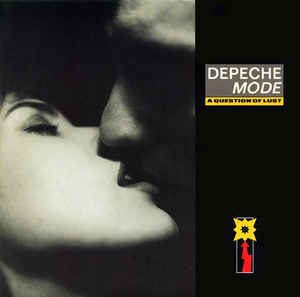
"A Question of Lust" is a song by the English electronic music band Depeche Mode from their fifth studio album, Black Celebration (1986). It was released on 14 April 1986 as the album's second single.
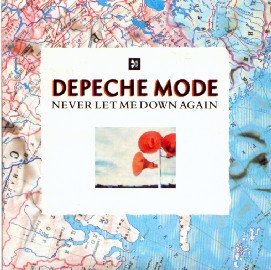
"Never Let Me Down Again" is a song by English electronic music band Depeche Mode. It was released as the second single from their sixth studio album, Music for the Masses (1987), on 24 August 1987. It reached No. 22 in the UK, No. 2 in West Germany, and the top-10 in several other European countries such as Sweden and Switzerland, topping the Danish charts. In the US, it entered the Billboard Hot 100. The cover art features fragments of a Soviet map of Russia and Europe, with different fragments used for the different editions of the single.

"Personal Jesus" is a song by English electronic music band Depeche Mode. It was released as the lead single from their seventh studio album, Violator (1990), in 1989. It reached No. 13 on the UK Singles Chart and No. 28 on the US Billboard Hot 100. The single was their first to enter the US top 40 since 1984's "People Are People" and was their first gold-certified single in the US. In Germany, "Personal Jesus" is one of the band's longest-charting songs, staying on the West German Singles Chart for 23 weeks.
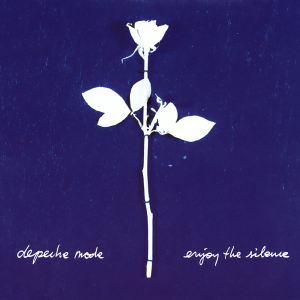
"Enjoy the Silence" is a song by English electronic music band Depeche Mode. Recorded in 1989, it was released as the second single from their seventh studio album, Violator (1990), on 5 February 1990. The single is certified Gold in the US and Germany. The song won Best British Single at the Brit Awards 1991.

"Policy of Truth" is a song by English electronic music band Depeche Mode, released on 7 May 1990 as the third single from their seventh studio album Violator (1990). It is the only Depeche Mode single to chart higher on the U.S. Billboard Hot 100 chart than on the UK Singles Chart, and it became the band's second chart-topper on the Billboard Modern Rock Tracks chart.
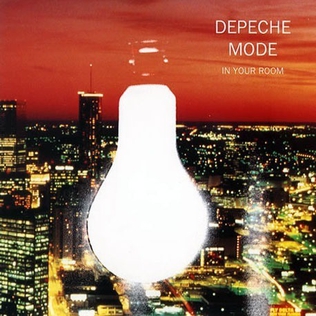
"In Your Room" is the fourth and final single released from English electronic music band Depeche Mode's eighth studio album, Songs of Faith and Devotion (1993). Released on 10 January 1994, the song reached number eight on the UK Singles Chart and peaked at number two in Denmark, Finland, and Sweden. It is the last single to feature Alan Wilder as a member before his departure in 1995.

"Useless" is a song by English electronic music group Depeche Mode, released on 20 October 1997 as the fourth and final single from their ninth studio album, Ultra (1997). It was released with "Home" as a double A-side in the United States due to "Useless" getting airplay on US radio stations before "Home" was announced. "Useless" features a bass contribution performed by bassist Doug Wimbish, known for his session work and as a member of Living Color.

"Freelove" is a song by English electronic music band Depeche Mode, released on 5 November 2001 as the third single from the band's tenth studio album, Exciter (2001). "Freelove" reached No. 19 on the UK Singles Chart. The single version, which was produced by Flood, is different than the album version, with a shorter running time and an additional drum track. The B-side is an instrumental called "Zenstation". There is also a DVD release of "Freelove", a first for Depeche Mode. It contains video footage of "Freelove" from the Philadelphia concert in 2001, audio of other songs performed at the concert, and four bonus 30-second videos of the band. The videos were directed by Anton Corbijn.

"John the Revelator" / "Lilian" is the second double A-side single released by English electronic music band Depeche Mode, issued on 5 June 2006. Both songs are included on the band's eleventh studio album, Playing the Angel (2005), and served as the fourth single from the album. The single became another UK top-20 hit for the band, reaching number 18. "John the Revelator" was edited down several seconds for the single, while "Lilian" was slightly remixed and the introduction was shortened.




















